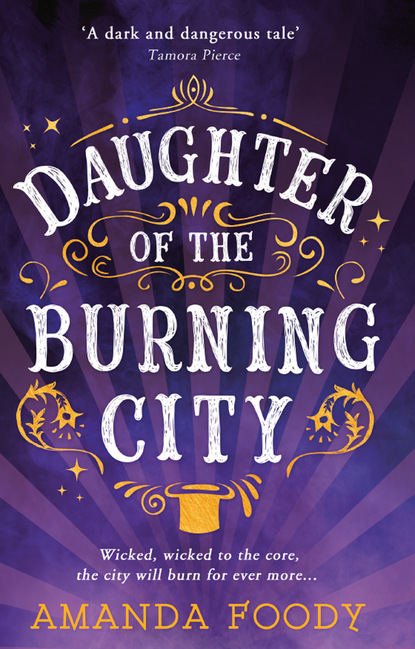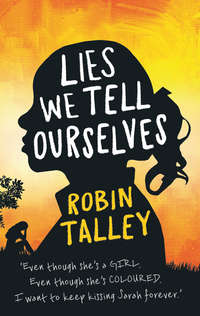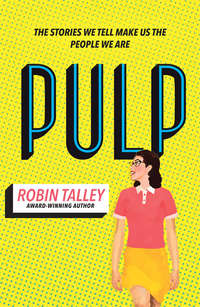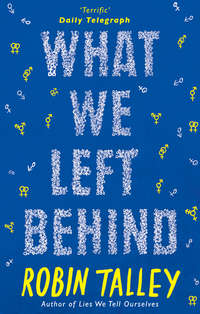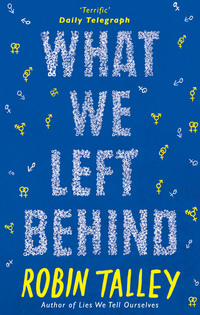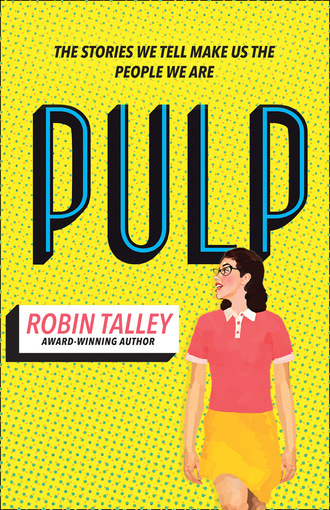
Полная версия
Pulp
“No, no. Fine. Stay in New York if that’s what you want. I’ll be here, doing everything. Again.” There was a thin, pained note in her voice Abby had never heard before. As though she was actively trying to sound like she was suffering. “No, he’s fine, but I already told you she’s upset. You don’t remember? I think she had a fight with her girlfriend, and—yes, it was about that. What did you think? No, no, she didn’t say anything, you know she never tells me anything, but if you paid attention to anything other than yourself, maybe you’d start to realize—”
Abby didn’t hear any more after that. She shoved a pillow over her head, dug out her headphones and turned the music up loud enough to drown it all out.
Now, though, she kind of wished she’d kept listening. As far as she knew, that phone call was the last time her parents had actually spoken to each other.
“They’re never both home at the same time,” Ethan was muttering. “You’re hardly ever home, either.”
“I have a lot of work to do. I’m a senior, dude.” Abby tried to sound playful. She’d called him dude when he was a kid, and it always used to make him smile.
“But don’t you think—”
“All right, Ethan, it shouldn’t be much longer.” The principal’s voice boomed above them. “Abby Zimet! So good to see you.”
“Hi, Mr. Geis.” Abby stood up. Mr. Geis had been the assistant principal when she was in middle school. “How are you?”
“Very well, Abby. You must be a senior? I’m sorry, you’re probably missing a meeting or practice this afternoon, aren’t you?”
“I just got back from the health care protest at the White House.”
“Of course you did.” Mr. Geis smiled at her, but from the way his eyes kept darting down, she could tell he wanted to focus on Ethan. “You always were passionate about the causes you believed in. Are you taking Contemporary Politics this semester?”
“No, I’m doing the Women’s and Gender Studies seminar instead.” Come to think of it, didn’t she have a paper due for WGS sometime this week? On that campaign down in Virginia—the transgender candidate who was running against the homophobe?
Abby remembered talking to Vanessa about it, but she couldn’t remember when she was supposed to turn it in. It couldn’t have been due today, could it?
Shit...
“Well, don’t let us keep you, Abby.” Mr. Geis was still smiling at her brightly. “It was good seeing you. Now, young man, come into my office, please.”
Abby watched her brother climb to his feet without lifting his head and follow the no-longer-smiling Mr. Geis into the inner office. He didn’t look back.
“Your dad should be here any minute,” Mr. Geis was telling him as Abby turned to leave.
“What about my mom?” she heard Ethan say.
Mr. Geis paused. “Your father said she was out of town.”
“She isn’t coming?” Suddenly, Ethan sounded frantic. He couldn’t actually be surprised Mom wasn’t coming all the way from Pittsburgh to pick him up from school, could he?
“I’m sure you’ll talk to her when she’s back home.” Mr. Geis had barely gotten the words out before Ethan started moaning. Footsteps squeaked in the hall outside. “Is something wrong, Ethan?”
“I don’t feel good,” Ethan croaked, in the fakest voice imaginable.
“What’s going on?” It was Dad, frowning in the doorway. Of course he’d show up right as Ethan was laying on the drama. “Abby? What are you doing here?”
His suit jacket was rumpled. He’d probably been wearing it since he got up that morning in New York. He would’ve worn it the entire train ride back to Union Station, and the cab ride to his office after that, and then through all his meetings or lunches or whatever it was he did all day. Neither of their parents ever went home until it was absolutely unavoidable.
Behind them, Ethan moaned again.
“Is Ethan sick?” Dad’s face shifted from confusion to worry. For a second, Abby was jealous she’d never thought to try fake moaning. “I thought they said he got in trouble with his teacher.”
“You can go on in, Mr. Zimet,” Ms. Jackson said, emerging from the back room. She didn’t seem particularly worried. She’d probably heard plenty of fake moans in her time. “Your son’s in with Mr. Geis. He was feeling fine before.”
“All right.” Dad turned back to Abby, as though waiting for her to solve this puzzle for him.
“He wants Mom,” she whispered, as patiently as she could manage. “He thinks if he’s sick you’ll both come, the way you did when he had that appendix thing. You should probably get Mom on the phone. If he hears both your voices he might calm down.”
“Abby, it isn’t as simple as...” Dad glanced toward the office. “Wait for us out here and we’ll all go home together, all right?”
“Oh, um...” Her eyes darted up, down, anywhere but at him. As much as she wanted her parents to act like parents again, the thought of actually being alone with her dad and her brother for any amount of time was excruciating. “I’ve gotta go. I have a big project for, uh, French...”
But Abby couldn’t think of anything more to say about her fictional French project, so she darted under Dad’s arm and out of the office.
She was halfway down the hall before she realized she was running. Dad wouldn’t come after her, though, not with Ethan and Mr. Geis waiting.
She swung around a corner into the huge, vacant main stairwell, listening out for footsteps in the hall behind her. Nothing came.
Abby climbed up one floor, and then another. The third floor looked empty. Surely Dad wouldn’t think to look for her up here. When they got out of their meeting he’d assume she’d already gone home, and he’d take Ethan somewhere to give him a talking-to.
She opened her laptop with shaky hands, though she wasn’t sure why—it wasn’t as if she could focus enough to do homework right now.
That was when Abby noticed the ebook sitting on her desktop, staring at her. Women of the Twilight Realm. Without pausing to think, she clicked it open. She was still on the third chapter, and the point of view had switched from Elaine to another character.
The new girl was magnificent.
She was young, certainly—no more than twenty or so. Her hand-stitched clothes marked her as a stranger to New York. She was a stranger to bars like Mitch’s Corner, too, Paula was sure of it. She’d seen enough first-timers to know the mix of apprehension and anticipation they always carried, even when they were doing their best to look tough. Before tonight, the pretty, little blond girl hovering by the jukebox with an unlit cigarette clamped between her fingers had never set foot in a queer bar.
She’d thought about it, though—Paula was certain of that much, too. There was something about the steely set of the new girl’s hips, and the way every so often she cast her eyes from side to side, watching the bar’s patrons as they danced and drank and talked. Yes, the girl might be new, but she wasn’t a total innocent.
Paula ordered a beer and a martini, and then, holding the drinks tight, sauntered over beside the new girl to peer down at the jukebox. The blond didn’t look up.
“The songs in that thing are no good,” Paula said, lifting the martini glass. “Old Max is so stingy he probably hasn’t bought a new record since the Hoover years.”
The blond met Paula’s eyes for a moment, then shifted her gaze back to her own white schoolgirl blouse.
Paula smiled. The new girl’s nerves only made her look prettier.
“I suppose I wasn’t really looking for a good song.” The girl took the offered martini and drained half of it in one gulp. “I only hoped that if I waited long enough, someone interesting might come over and talk to me.”
Paula didn’t bother trying to conceal her reaction. She laughed, long and loud, and let herself relax a little. “I hope I fit the bill.”
The girl appraised Paula, taking in her height, her faded brown slacks, the full glass of beer sweating in her hand.
“Interesting, yes.” The girl nodded. “So far. But if I’m going to make a full assessment, I think we’ll need to dance.”
Paula smiled. If she was going to keep up with this one, she’d need to be quick. She took both drinks and set them on the little table next to the jukebox, then looped her arm around the girl’s back and steered her toward the dance floor.
“You got a name, new girl?” she asked, teasing, as they started to dance.
“Elaine.”
“It’s a pleasure, Elaine. I’m Paula.”
“Well, Paula, what do the girls do for fun in this city when they’re not sipping martinis and dancing to old records here in Mitch’s Corner?”
Paula smiled again, winding her arm around Elaine’s back to pull her in close. “I can only speak for myself, Elaine, but I like to hit the movies.”
“Alone?”
“If I have to. But I’ve found everything looks better when there’s a pretty girl by your side.”
Abby tilted her chin to the ceiling. In spite of herself, a grin crept onto her face.
Meet-cutes were overdone, but Abby had always loved those old-fashioned romance novels the library had on spinner racks. The formulaic romantic comedies you could get on Netflix, too. They were all so predictable. Maybe that was why it was so delightful to lose herself in them.
She could recite the plot template by heart. A woman and (usually) a man met, traded witty banter and fell in love. There was always some stupid obstacle to them living happily ever after—one of them was a cattle rancher and the other one was a vegetarian, or one was a workaholic and the other was a manic pixie dream girl, or whatever—but they figured out how to overcome it and learned important lessons along the way. Then they did live happily ever after, without ever encountering a single problem for the rest of their lives.
It was all ridiculous and silly and unrealistic. Abby knew that. She’d only ever been in love with one person, but she still knew fantasy when she saw it.
Love didn’t conquer all. Whatever else was going on in the lives of Paula and Elaine outside that smoky bar in 1956 wasn’t going to stop just because the two of them had danced and bantered.
But God, it would be fucking wonderful if it did.
Abby settled down with her back against the wall and clicked through to the next page. She put in her headphones so she wouldn’t hear anything from downstairs and focused on the screen in front of her.
It wouldn’t be so bad to lose herself again.
Chapter 4
Tuesday, June 28, 1955
“Welcome to the Soda Shoppe, your top spot for a refreshing drink and a bite to eat. I’ll be your carhop this afternoon.”
“Hi there, honey. Could I get a cheese sandwich and a Summer Freeze?”
“Righty-o.” Janet suppressed a yawn as she scribbled down the order from the bald man in the station wagon.
Someone whispered loudly over her shoulder. “Janet? Janet! Over here!”
Janet didn’t let her smile slip as she delivered the next line in her script—“Back in a jiff!”—and trotted away from the station wagon to see Shirley, one of her fellow carhops, looking anxious.
“Could you cover car nine for me?” Shirley shifted from one foot to the other. “I haven’t had my break yet and I’m about to burst.”
Janet glanced over her shoulder. “Sure. You’d better hurry or Mr. Pritchard will see.”
“Thanks, Janet. You’re a star.”
Janet waved her on and trotted to space nine. Carhops were permitted to trot across the parking lot, but never to run. Mr. Pritchard, who watched over the staff with an unyielding expression and a blue vinyl apron tied snugly around his middle, was even stricter about running on shift than he was about break schedules.
Janet took down car nine’s order and trotted inside to the food counter. The Soda Shoppe had started out as a regular restaurant, with tables inside and waitresses to serve them, before Mr. Pritchard realized he could make a lot more money sending high school girls out to the parking lot while the customers sat in their Oldsmobiles and Chevrolets. Now the shiny lunch counter inside sat empty while Janet, Shirley and the other girls wore out their saddle shoes trotting from car to car in their too-hot-for-summer-in-Washington cotton uniforms.
As she lifted her tray, Janet gazed at the empty phone booth that sat at the edge of the parking lot, the cars on M Street whizzing past.
Soon. Janet’s shift would end soon, and then she could call her. That prospect was the only thing getting her through the afternoon’s endless script recitations and grease drips.
So an hour later, when the last car of her long lunch shift finally pulled away, Janet rushed to finish her side work, folding napkins and marrying ketchup bottles faster than she ever had before. She tapped her fingers on her apron while Mr. Pritchard inspected her station, and when he finally cleared her to go Janet trotted as fast as she could to the phone booth and shoved a dime into the slot.
She picked up on the second ring.
“I’d hoped it was you.” The smile was clear in Marie’s voice before Janet had even finished saying hello.
Janet wound the phone cord around her fingers and turned her back on the still-busy restaurant. She was smiling, too, even though Marie couldn’t see her.
“I haven’t been able to stop thinking about last night.” Marie’s voice was a low, warm whisper.
“Neither have I.” Janet closed her eyes. If she tried hard enough, perhaps she could pretend they were still on that dark street outside Meaker’s.
“I want to see you again, soon, but I start work tomorrow. I’ll probably be busy for the next few days.”
“I understand,” Janet replied, though her stomach sank. “Maybe we could meet this weekend.”
“I’d like that. I should be free Saturday.”
“Saturday it is, then.”
They fell silent. Janet traced the tips of her fingers along the curve of the phone cord, wishing she were tracing the delicate skin of Marie’s shoulder instead.
“Could you wait a moment, please?” Marie’s tone suddenly grew a tad too polite. This must’ve been how they taught girls to talk on the phone in secretarial school.
“Certainly.” Janet giggled and waited, wondering what Marie’s teachers would’ve thought of the moment she and Marie had shared the night before.
“There, that’s better.” Marie’s voice came muffled after a pause. “I’ve brought the phone into the pantry. The cord may be about to snap, but at least we can talk in private. Though I’m supposed to be helping my mother with the ironing.”
“Oh.” Janet opened her eyes. “Well, if you have to...”
“But I don’t want to help her. I’d rather talk to you.” Marie paused, drawing in a sharp breath. “I’d rather talk to you always.”
“Oh.” Janet’s knees felt unsteady. “Oh, Marie—it’s the same for me.”
“Where are you? I can hear cars going by.”
Janet smiled again. “I’m in the phone booth at the Soda Shoppe. I keep worrying Mr. Pritchard will come yell at me for forgetting to fold a set of napkins.”
“Tell him you have more important things to do. Like talk to me.”
Janet’s smile stretched from one end of the phone booth to the other. Marie sounded exactly like Sam in A Love So Strange when she and Betty first fell in love.
Was that what was happening to Janet and Marie, too?
“Marie?” Mrs. Eastwood’s voice was unmistakable, even through the pantry door. “What are you doing in there? I need your help. Besides, you shouldn’t stretch out the phone cord.”
Marie sighed into the phone. Janet sighed, too. “I suppose I’ll see you Saturday. Good luck at the new job.”
“Thank you.” Marie’s smooth phone manners were back, probably for her mother’s benefit. “Please give your family my best.”
Janet smoothed out her uniform before she left the phone booth, but her smile stayed wide.
The walk home was no more than fifteen minutes along M Street and up Wisconsin. Nothing in Georgetown was terribly far from anything else. Janet’s and Marie’s houses were close enough that their parents had often driven them to school together when they were still too young to ride the streetcar unaccompanied. Marie’s job, though, would be in the next neighborhood over. The State Department had been in Foggy Bottom since the war.
It was hot out, and Janet, already warm from her shift, grew sweaty as she walked under the hot sun in her silly blue cap, smiling at the shoppers who nodded as they passed. Everyone recognized her Soda Shoppe uniform. Employees were never allowed to be in “partial uniform,” even when their shifts were over.
Janet wished she had a proper job like Marie. Neither of the girls in A Love So Strange had to trot around with steaming piles of cheeseburgers for hours each day. They worked in sensible offices with spiteful coworkers.
Janet had reread half the book after she’d gotten home from Meaker’s the night before, and she’d reread the other half that morning before her shift. She couldn’t stop thinking about the moment when Betty first told Sam she was falling in love with her. Sam had replied that she’d known she loved Betty since the first time they danced.
Were there truly girls—other girls, girls Janet had never even met—who thought things like that? Who said things like that?
Janet and Marie didn’t much resemble the girls on the cover of A Love So Strange. Janet was blond and Marie was brown-haired, so they matched on that count, but neither of them wore as much makeup as those girls, and Janet certainly didn’t own any clothes that tight.
She supposed the girls’ looks weren’t what mattered in the end. What mattered was that, like Janet, the girls in Dolores Wood’s book didn’t seem to have much interest in men.
Until the book’s odd ending. In the final chapter, Betty had suddenly become interested in a fellow she worked with, and Sam was fired from her job and threw herself in front of a speeding taxi.
Janet always skipped that chapter now. It felt as if it had been glued on to the real book by mistake. A Love So Strange was meant to be about two girls living in New York, going out in Greenwich Village, kissing and dancing and drinking with other girls like them. That was the book that mattered.
It still seemed impossible that such lives, such places, could be real—and yet they had to be. Why would Dolores Wood write about them otherwise?
In A Love So Strange, Sam never spoke to her parents. She’d been forced to leave the family because of how she was. Betty was on good terms with her parents, but only because she kept up the pretense that she was normal. When Betty’s parents came to visit, Sam slept in the small bed in their spare room as though she were no more than a roommate, and the two girls were careful to make sure that room looked truly lived in, too, hanging pictures on the walls and storing knickknacks on the shelves. They intended to look innocent, even if someone were to report them to the police.
What would happen to Janet if her family discovered she’d kissed Marie? Or, for that matter, if they found the book tucked under her mattress?
Her parents would be devastated. Grandma, too.
Janet would never be able to live a regular life. She’d never get married. Unless she were to move far away, leaving behind everything she’d known, and somehow found a husband for herself in a strange new city.
Janet wasn’t entirely sure she wanted a husband anymore, though.
She’d never thought much about that particular question before. It had never seemed a question in the first place. Everyone got married. It was either that, or become a nun like the sisters at St. Paul’s.
Well, at least there was no need to worry about her family calling the police. Her father’s career was on shaky ground as it was, now that the Democrats had retaken Congress. If they found out about Janet, it would mean disaster for him. Besides, nowadays everyone knew these things were for doctors to handle. If Janet’s parents found out, they’d want her cured and quickly.
Perhaps they’d send her to St. Elizabeths. That was the new name for the local asylum, though some still called it the Government Hospital for the Insane. What if news of Janet’s admission got into the papers, though? The man who wrote the Washington Watch column was all too eager to write about the wrongdoings of Republicans, and a Senate committee attorney’s daughter entering an asylum would be news for at least a day or two, even if her specific illness wasn’t revealed. That day or two of news could be enough to ruin her father’s prospects forever.
No—most likely, her parents would confine her to the house. They might find a discreet doctor to make house calls until she was properly cured.
Janet wondered what such a cure entailed. All she knew about psychiatry was that the patients lay on couches and closed their eyes. That didn’t seem so terrible—but could it really change the way she felt about Marie?
Though the real problem was, Janet didn’t want to stop feeling the way she did.
Perhaps resistance to treatment was part of the sickness. Yet she didn’t feel sick. She felt healthier than she ever had before.
As Janet’s squat two-story row house came into view, she squared her shoulders and pulled off her cap. She ought to simply put all these worries aside for the time being. It was going to be a very busy summer.
The house was quiet as she approached. Her parents had gone to dinner at the club again, leaving Janet and Grandma to an evening on their own. On nights like this one, Janet usually warmed up a casserole and chatted with Grandma while they ate. After dinner they might listen to the radio awhile, then read in comfortable silence until bedtime.
The heat indoors was nearly unbearable on summer nights, so Mom and Dad usually slept on the screened porch at the back of the first floor, with Janet and Grandma on the separate porch just above. It had been their pattern ever since Grandma moved in. She’d declared as soon as she’d unpacked that, although she’d consented to live with them, she would not be forced to tolerate Janet’s father’s snores. It had been bad enough when he was a boy, she’d said, but now that he was grown she was no longer obliged to suffer.
Janet climbed the steps to the front porch, taking care to avoid the rickety old railing, and unlocked the front door, slipping off her shoes in the foyer in case Grandma was resting. In the evenings, every sound in the house was magnified.
A bright shape on the entry table caught Janet’s eye as she shrugged off her uniform jacket. A white envelope, solitary and stark against the shining black wood.
Janet snatched up the letter, her jacket falling to the floor. Panic rose in her throat at the sight of the typed letters across the front, spelling out her name in neat black ink. As her eyes flicked to the return address, she half prayed it was merely another letter from Holy Divinity.
Not this time. Bannon Press, the envelope proclaimed, followed by an address in New York City.
It had come.
Janet hugged the letter to her chest, her shoulders trembling under her thin white blouse. The envelope felt warm against her skin.
The seal was still in place. This letter was hers and hers alone.
Janet would take it straight to her room. She wanted to read the letter over and over, the way she’d done with A Love So Strange. She ran up the steps, her heart pounding, and didn’t slow when she reached the second-floor landing. Her hand was on the door to her bedroom when the voice came behind her.
“Why are you in such a hurry there, girl?”


